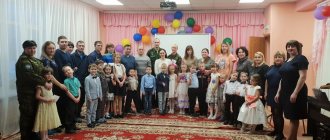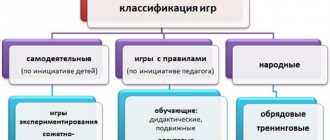MAGAZINE Preschooler.RF
Methodological development “Interactive forms of working with parents in preschool educational institutions”The renewal of the preschool education system, the processes of humanization and democratization in it have determined the need to intensify the interaction of the preschool institution with the family. The family is a unique primary society that gives the child a feeling of psychological security, emotional support , and support. Family is also a source of social experience. Here the child finds role models, here his social birth takes place.
Domestic pedagogical science has accumulated significant experience in the field of interaction between kindergarten and family: K.D. Ushinsky, N.K. Krupskaya, P.F. Lesgaft, A.S. Makarenko, V.A. Sukhomlinsky. Relevant for the modern pedagogical process are their scientific generalizations and conclusions that the family is the beginning of all beginnings, the educational institution where the foundations of a comprehensively developed personality are laid. And if we want to raise a morally healthy generation, we must solve this problem “with the whole world” : kindergarten, family, public. The interaction between family and preschool educational institution plays an important role in the development and upbringing of the child.
Currently, interaction with parents of pupils occupies a worthy place among the priority areas of the educational process of preschool institutions. Most teaching staff are clearly aware of the priority of family education along with the need for psychological and pedagogical assistance to parents.
Modern researchers note the importance of interaction between teachers and parents for the upbringing and development of preschool children. The inclusion of the family as a partner and active subject in the educational environment of a preschool educational institution qualitatively changes the conditions of interaction between teachers and parents who have their own strategic interests in the field of preschool education of the child.
In their works, scientists propose various forms and methods of fruitful cooperation between preschool institutions and families - T.N. Doronova, T. A. Markova, E. P. Arnautova; reveal the need for self-development of educators and parents - A.V. Kozlova, E.P. Arnautova; offer interactive forms of teacher work with families - E.P. Arnautova, T.N. Doronova, O.V. Solodyankina.
T.A. Markova, N.F. Vinogradova, G.N. Godina, L.V. Zagik, pay attention to the content of work with the family:
- unity in the work of preschool educational institutions and families in raising children
- mutual trust in relationships between teachers and parents
- the use of various forms of work between the kindergarten and the family in their interrelation
- individual and group forms of work with parents.
Features of organizing interactive forms of interaction with the family.
In a modern preschool educational institution, new, interactive forms of cooperation with parents are used, allowing them to be involved in the process of learning, development and knowledge of their own child.
The word “interactive” came to us from the English language from the word “interact” , where “inter” is mutual, “act” is to act.
Interactive means the ability to interact or be in a conversation, dialogue mode with something (for example, a computer) or someone (for example, a person).
Hence, interactive forms of interaction are, first of all, a dialogue during which interaction takes place.
Let's consider the main characteristics of “interactive” :
- this is a special form of organization, with comfortable conditions of interaction, in which the student feels successful and intellectually competent
- the interaction process is organized in such a way that all participants are involved in the process of cognition and discussion
- Dialogue communication leads to interaction, mutual understanding, and joint acceptance of the most common, but significant tasks for each participant
- each participant makes his own special individual contribution, has the opportunity to exchange knowledge, his own ideas, methods of activity, and hear different opinions of colleagues
- domination of either one speaker or one opinion is excluded
- the ability to think critically, reason, and solve controversial problems is formed based on the analysis of information heard and circumstances
- respect for other people’s opinions, the ability to listen, and make informed conclusions are formed
- the participant can not only express his opinion, view, give an assessment, but also, having heard the evidentiary arguments of his colleagues, abandon his point of view or significantly change it
- participants learn to weigh alternative opinions, make thoughtful decisions, express their thoughts correctly, participate in discussions, and communicate professionally
- An indicator of the effectiveness of group activity is, on the one hand, the group’s labor productivity (its productivity), and on the other, the satisfaction of group members with joint activities.
The goals of interactive interaction can be different:
- experience exchange
- development of a common opinion
- formation of skills
- creating conditions for dialogue
- group cohesion
- changes in the psychological atmosphere.
Currently, non-traditional interactive forms of work with parents, based on cooperation and interaction between teachers and parents, are actively used. In new forms of interaction with parents, the principle of partnership and dialogue is implemented. Plan in advance for conflicting points of view on issues of raising children (punishment and rewards, preparation for school, etc.). The positive side of such forms is that a ready-made point of view is not imposed on the participants; they are forced to think and look for their own way out of the current situation.
Family clubs. Unlike parent meetings, which are based on an edifying and instructive form of communication, the club builds relationships with families on the principles of voluntariness and personal interest. In such a club, people are united by a common problem and a joint search for optimal forms of helping a child. The topics of the meetings are formulated and requested by parents. Family clubs are dynamic structures. They can merge into one large club or split into smaller ones - it all depends on the theme of the meeting and the plans of the organizers.
Discussion is one of the most important forms of activity that stimulates the formation of a communicative culture.
The object of discussion can be a truly ambiguous problem, in relation to which each participant freely expresses his opinion, no matter how unpopular and unexpected it may be.
The success or failure of the discussion is determined, among other things, by the formulation of the problem and questions.
The following forms of discussion are distinguished:
- the round table is the most famous shape; its peculiarity is that the participants exchange opinions with each other with complete equality of rights for each;
- symposium - a discussion of a problem, during which participants take turns making presentations and then answering questions;
- debate - discussion in the form of pre-prepared speeches by representatives of opposing, rival parties and refutations, after which the floor is given to participants from each team for questions and comments.
The pedagogical value of a discussion increases if the discussion process itself is comprehended, and presenting one’s point of view helps to comprehensively comprehend one’s own position and understand another point of view, master new information and arguments. A more in-depth analysis of the discussion can be carried out by recording it on a voice recorder.
By organizing a discussion, the facilitator orients the participants toward an attentive, unbiased attitude to various opinions and facts, and thereby forms their experience of constructive participation in the exchange of opinions and judgments. Mastering communication models that include discussion is inevitably associated with working on changing one’s own personality towards a discussion culture, which is so lacking in the world around us [, Solovey S., Lvova T., Dubko G. Discussion as a form of work with parents]
| Next > |




